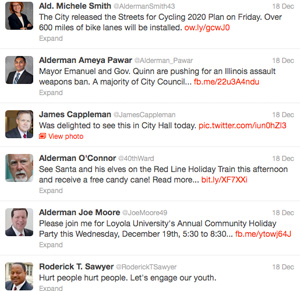| « Entrepreneur-in-Chief: The New Model City | Chicago's TIFs Have a New Watchdog » |
Aldermen Tue Jan 08 2013
City Hall: Who has Social Media Klout?
By Myles Dannhausen and Andy Crestodina
Chicago Alderman James Cappleman (46th Ward) was taken to task on Twitter in December when he proposed a crackdown on the great scourge of Chicago — pigeons.
(What, you thought it was gang violence? Or drugs? Or deteriorating infrastructure?)
WBBM's Steve Grzanich (@steveGrzanich) called Cappleman out on his odd sense of priorities, as did blogger Dwana De La Cerna (@JustDwana), who tweeted:
im sorry but city has more pertinent issues like charging gangs as the terrorists they are @chicagoist @jamescappleman #enuffstupidlaws
— ~ Dwana (@JustDwana) December 13, 2012
To his credit, Cappleman took the criticism in stride, engaging with his constituents and inviting them to meet with him.
@justdwana @chicagoist uptownupdate.com/2012/08/birdma... Public safety and economic development are primary, but this still remains an issue.
— James Cappleman (@JamesCappleman) December 13, 2012
@stevegrzanich Please first read the Ward Master Plan so you'll know first hand what I'm doing. Saturday mornings require no appointment.
— James Cappleman (@JamesCappleman) December 13, 2012
This got us thinking about how our city's aldermen are using Twitter to communicate with constituents.
Any of our 50 aldermen would tell you that transparency and access to information is critical. But not all of them use social media to connect with constituents. Some aldermen use Twitter, others don't. Few use it well.
Most use it to tweet about business events, their latest newsletter, photo opps, and other fluff. Some send City Hall news, and a few, like Cappleman, actually recognize Twitter's power to engage and communicate with their people.
 This in a city whose aldermen and mayor yearn for tech legitimacy. Regardless of how you feel — or don't feel — about the battle against pigeons, we give Cappleman credit for responding.
This in a city whose aldermen and mayor yearn for tech legitimacy. Regardless of how you feel — or don't feel — about the battle against pigeons, we give Cappleman credit for responding.
Kevin Hauswirth is Mayor Rahm Emanuel's social media director, a position that didn't exist before Emanuel took office in May of 2011. The handle @Chicagosmayor has nearly 20,000 followers.
"We see it as an extension of Mayor Emanuel's drive to be as engaged and transparent as possible," he says. "It really comes from that."
That doesn't mean that Hauswirth is engaging in deep policy discussion on Twitter, but the office is using it as both a broadcast and a listening device.
"Like any good communication there has to be a dialogue," he says. "But while we may use it to communicate policy and news, it's great for us to get feedback. That helps us shape the content we send out. If there was ever a feeling that social media was a toy, there's now a recognition that it's a powerful tool."
He has found that Twitter is especially effective when it comes to talking to niche constituents bound not by geography, but by issue.
"There is a very active community involved in transportation initiatives," he says. "There's a very active community talking about green energy initiatives and sustainability. The beauty is that through social media we can be involved in these conversations that we can't offline."
Clout vs. Klout
This takes us to Klout.
Just as clout means influence on the council, Klout is a measurement of influence in social media. It's a 1-100 score that factors in the size of a person's Twitter following and the likelihood that others are influenced and engaged. Just like in City Hall, if you have influence over the very influential, your Klout score is higher.
For the record, we don't feel that Klout is an important metric in social media (lots of people with high Klout scores aren't really all that influential, and vice versa). But paying attention to Klout is a good way to encourage yourself to be active on Twitter (in other words, to gamify your web marketing).
You might have more Klout than Ed Burke, but we all know who has more clout. However, our aldermen might improve both scores if they learn to use digital tools not just to campaign, but to involve their constituents in their communities.
How about crowd-sourcing ideas? Posting meeting times and topics? Posing questions about pressing issues or even jumping into debates with constituents too intimidated to speak up in person?
By our count, just 32 of 50 city aldermen have a Twitter presence, and still fewer are active users. This in the hometown of Barack Obama, whose campaign transformed the way social media is used to swing elections. (Obama's Klout score, by the way, is a very respectable 99.)
Most aldermen who do use it keep it pretty basic, often posting local business plugs or sending their newsletters. Others occasionally add policy or meeting info, like Ameya Pawar in the 47th. Some simply retweet articles or inspirational quotes.
Who scores well? The Mayor's Office, of course (it's the most active), but some of the other alderman who use Twitter effectively might surprise you, like Patrick O'Connor of the 40th Ward and Will Burns in the 4th.
Who has them all beat? The City Clerk's Office, with a Klout score of 73.
Here's a quick look at how Chicago's aldermen are using Twitter, and their, um, Klout.
We've also created a Twitter list of all the aldermen's accounts.
Tweets from @gapersblock/chicago-aldermen
~*~
Andy Crestodina is the strategic partner at Orbit Media. Find Andy on Google+ and Twitter.
Myles Dannhausen is a freelance writer who lives in Lincoln Square. Find him on Twitter.












J Brennan / January 16, 2013 11:24 AM
Good article and appropriate comparison of Klout vs. clout using E. Burke. What does is mean when it says, "LOCKED" after the Twitter addr for several Aldermen?